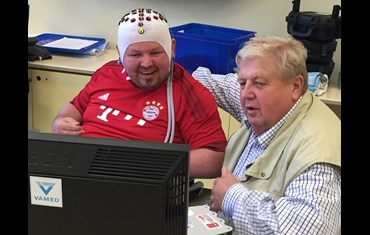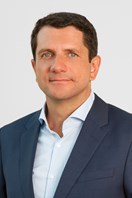Battle of minds – VAMED Rehab Kapfenberg sends Styrian athlete to the world premiere of the “Cybathlon”
9/23/2016
ETH Zurich invites to the world’s first robot-assisted competition for athletes with severe disabilities – Ex-natural track luger starts for the team of the Technical University of Graz
Kapfenberg / Zurich – In Zurich in Switzerland, in two weeks the first international Cybathlon is going to be held. Here for the first time people with severe physical disabilities will compete in sports competitions with the latest prosthetic technologies and robotic assistance systems. For the team “Mirage 91” of the Technical University of Graz, the former sports director of the Austrian national team in Natural Track Luge, Gerhard Kleinhofer, will start.
Kleinhofer has been suffering from severe motor limitations since a severe stroke two years ago. At the Cybathlon, using a brain-computer interface he will steer a figure on the computer in a virtual race through an obstacle course solely by the power of his mind. In the neurological therapy center VAMED in Kapfenberg, where Kleinhofer has been preparing intensively for the competition in recent months, the final preparations took place on Thursday.
The Team “Mirage 91” of the Technical University of Graz is about to start
Chief physician Dr. Matthias König, Medical Director of the Neurological Therapy Center Kapfenberg (NTK), is convinced that Gerhard Kleinhofer is the ideal pilot for this competition. VAMED has supported the BCI Racing Team headed by Univ. Prof. Dipl.-Ing. Dr. techn. Gernot Müller-Putz from the Institute for Neurotechnology of the TU Graz in finding the most suitable pilot. “We have nominated Gerhard Kleinhofer, because he loves competitions and as a former natural track luger still has an incredible sense of movement. That it is of great benefit to him”, said König.
In BCI racing, athletes need to think specifically about how they move their hands or feet, sing, or do mental arithmetics. The brain waves thus triggered are measured and thus steer a computer character through a virtual course. Already during the training, Kleinhofer constantly scored new bests. Thanks to the rehab, the father of a four-year-old son from Gußwerk near Mariazell (Bruck-Mürzzuschlag) fought his way back to life at full throttle.
In the future, brain-computer interfaces will make it possible to operate an electric wheelchair, a computer, or other equipment without pressing a single key. Gerhard Kleinhofer can move his fingers slightly and thus control his wheelchair independently or send text messages. “In rehabilitation, in this case the BCI training can help, by selective stimulation techniques, to train paralyzed limbs systematically until the affected person can use them functionally again”, said König.
For more information and a video of the BCI training in Kapfenberg, see VAMED TV: https://www.youtube.com/watch?v=AxUWNM6BS0E
74 athletes from 25 countries at the first Cybathlon
For the first international bionic contest on October 08 in the Swiss Arena in Zurich-Kloten, 74 athletes in 59 teams from 25 countries have registered. The BCI Race is one of six disciplines in which the teams compete. Here technologies formerly known only from science fiction do take the step from imagination and the laboratory into reality. Pilots with complete leg paralysis overcome an obstacle track using exoskeletons, athletes with spinal cord injuries compete in bike racing through electrical muscle stimulation, and sportspeople who have lost extremities due to illness or an accident participate in skill competitions with robotic hands or leg prostheses.
Like the Olympics and Paralympics, the Cybathlon is intended to take place every four years in the future. Unlike the Paralympics recently held in Rio, however, in the Cybathlon the focus is not on maximum sporting performance, but on the optimal combination of robotic tools and their users in the foreground. The objective of the event is to promote the international exchange in the development of novel assistive technologies suitable for everyday use, and to further reduce the barriers between people with special needs, the general public, and the technology developers.
VAMED, one of the leading private rehabilitation providers in Austria, supports this international event. VAMED is currently running 15 rehabilitation clinics (12 in Austria, 2 in Switzerland and 1 in the Czech Republic). Seven of them deal with neurological rehabilitation. With its hospitals, VAMED is committed not only to the best possible care and to treatment at the highest level, but to innovations and to the development of new approaches in rehabilitation of international reputation as well.
The future of brain-computer interfaces
Future BCIs will be able to replace, restore, improve, and enhance physical functions. “This begins with the ability to communicate and extends through muscle and nerve stimulation to increased capacity for attention”, says Gernot Müller-Putz. He manages the Institute for Neurotechnology of the Technical University of Graz, has launched the student team Mirage 91, and is an internationally recognized BCI expert who has been responsible for drafting the BCI road map for the EU.
This road map serves as a guide for research funding agencies and provides an overview of the state of affairs and the BCI trends. In 2025, there will be a wide range of brain-driven applications – according to the BCI road map as a standard in medical treatment and therapy, and personal health monitoring. “For teams like Mirage 91, the Cybathlon is a great opportunity to compete with other BCI teams and learn from each other. In the research and development of BCI applications, cooperation partners such as the Neurological Therapy Center Kapfenberg and VAMED are vital to us”, emphasizes Müller-Putz.



